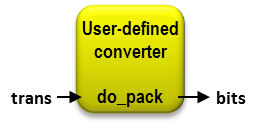UVMC Converter Example - SC Converter Class, Macro-Generated
This example demonstrates how to define an external converter for a transaction class using a UVMC_UTILS macro. The macro expands into a template specialization of uvmc_converter<T> for your type T, overriding the default converter’s implementation. An example showing how to write such a template specialization without the convenience macros can be found in UVMC Converter Example - SC Converter Class.

In SC, a separate converter class definition is usually required because most SC transactions do not implement the pack and unpack member functions required by the default converter. To UVMC_UTILS macros can be used to quickly define a converter for your transaction type. The macro would expand into the same code you would write directly, so these macros do not suffer from the performance and debug costs associated with other macros such as the `uvm_field macros.
The UTILS macros also defined operator<< for the output stream (e.g. cout). With this, we can print the transaction contents to any output stream. For example:
packet p; // initialize p... cout << p;
This produces output similar to
'{cmd:2 addr:1fa34f22 data:'{4a, 27, de, a2, 6b, 62, 8d, 1d, 6} }Template specializations are chosen automatically by the C+ compiler, so you will not need to explicitly specify your converter type when connecting via uvmc_connect.
| UVMC Converter Example - SC Converter Class, Macro-Generated | |
| This example demonstrates how to define an external converter for a transaction class using a UVMC_UTILS macro. | |
| User Library | This section defines a user transaction class and generic consumer model. |
| Conversion code | This section defines a converter for our packet transaction type using a UVMC_UTILS macro for each class in the packet inheritance hierarchy.. |
| Testbench code | This section defines our testbench environment. |
User Library
This section defines a user transaction class and generic consumer model.
namespace user_lib {
class packet_base
{
public:
enum cmd_t { WRITE=0, READ, NOOP };
cmd_t cmd;
unsigned int addr;
vector<unsigned char> data;
};
class packet : public packet_base
{
public:
int extra_int;
};
}Conversion code
This section defines a converter for our packet transaction type using a UVMC_UTILS macro for each class in the packet inheritance hierarchy..
The definition of the SC-side template specialization is so regular that a set of convenient macros have been developed to produce a converter class definition for you. You need to invoke one of these macros, depending on the number of fields in your transaction class and whether it inherits from a base class.
#include "uvmc.h" using namespace uvmc; using namespace user_lib; UVMC_UTILS_3(packet_base,cmd,addr,data) UVMC_UTILS_EXT_1(packet,packet_base,extra_int)
Testbench code
This section defines our testbench environment. In the top-level module, we instantiate the generic consumer model. We also register the consumer’s ‘in’ export to have a UVMC connection with a lookup string ‘stimulus’. The SV-side will register its producer’s ‘out’ port with the same ‘stimulus’ lookup string. UVMC will match these two strings to complete the cross- language connection, i.e. the SV producer’s out port will be bound to the SC consumer’s in export.